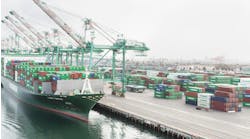As 2012 kicked off, the supply chain was still waiting to feel the full effects of conflict minerals legislation passed more than a year-and-a-half ago. Government officials were wading through industry input collected during a comment period that ran through early 2011, noting their careful approach to what had become an increasingly complex and controversial new law regarding reporting requirements for the sourcing of certain minerals from the Democratic Republic of the Congo (DRC).
Part of the Dodd-Frank Wall Street Reform and Consumer Protection Act, the conflict minerals amendment requires publicly traded companies to disclose annually whether or not they have used tantalum, tin, tungsten, and gold mined from the DRC, where trade in such minerals fuels criminal networks and is perpetuating violence in the region. The legislation aims to stem violence in the area by curtailing trade and stopping the flow of money to violent regimes.
The legislation will have a profound effect on the electronics industry, as the minerals in question are widely used in electrical and electronic equipment. Representatives from throughout the supply chain are working together to determine best practices for tracking and identifying the source of such minerals. But until a final rule is issued, questions linger over issues such as China, which has said it will not divulge the sources of its raw materials. The federal Securities and Exchange Commission (SEC) is expected to issue rules early this year—between January and June—and electronics distributors are among the key players keeping tabs on the issue.
As of late January, distributors such as Newark/element14 were anxiously awaiting the final regulations so they could gather the appropriate information from their supplier partners to pass along to customers. The complexity of the electronics supply chain and the resistance to the legislation in the Congo have been key obstacles.
To the first point, manufacturers must trace minerals back through three layers of the supply chain, as they purchase them from a refiner, who got them from a smelter, who purchased them from the original mine. Second, many workers, businesses, and government officials in the Congo view the rules as a ban on doing business in the region, not as a way to curtail local violence.
“I think the salient points are that it is a complex supply chain, and most people don’t realize that,” says Ken Manchen, corporate director of environment, safety, and health in the Americas for distributor Newark/element14, pointing to the difficulty of tracking minerals back to the mine of origin. “The other aspect I think people don’t realize is the Congo’s reaction. They think it’s a ban on doing business in the Congo. It’s a more complex issue than it appears.”
Newark/element14 is working with other supply chain companies on two industry task forces governed by IPC-Association Connecting Electronics Industries, a global trade group representing companies involved in all facets of the electronics interconnection industry. IPC has developed a host of resources to help companies navigate the conflict minerals issue and is now working on a conflict minerals due diligence document as well as a data exchange standard for conflict minerals. Also, it is working to ensure that key industry issues surrounding the legislation are addressed, including a proposed phase-in of the reporting requirements.
“The SEC must utilize all reasonable options to lessen the burden of implementation, the most important of which is a phasing-in of the regulations to allow industry the time to work with their complex global supply chains to develop traceability and compliance data,” IPC said in a statement on the issue last fall.
The Electronics Industry Citizen Coalition and its Global e-Susainability Initiative is another group working toward compliance goals with its Conflict Free Smelters (CFS) program. The CFS is a voluntary program in which an independent third party evaluates a smelter’s procurement activities and determines whether or not the smelter demonstrated that all the materials it processed originated from conflict-free sources.
To wade through the complexity of the issue, Newark/element14’s Manchen sat down with Electronic Design/SourceESB in late January to discuss the scope of the issue and its potential impact on the electronic supply chain. What follows are excerpts from our conversation:
Electronic Design/SourceESB: There have been delays in the implementation of the reporting requirements surrounding the conflict minerals legislation. What is your understanding of the state of the issue?
Ken Manchen: The [Securities and Exchange Commission] expected to issue regulations in early 2012. SEC target is January-June 2012.
Once the final regulations are released, companies will be required to report annually. If issued in February, and a company’s fiscal year begins on July 1st, it will have to file a conflict minerals report on its use of conflict minerals from July 1, 2012 – June 30, 2013. The reports will also be subject to third-party auditing.
The requirements will apply to U.S. and non-U.S. suppliers. Although reporting requirements only apply to publicly traded companies required to report to the SEC, it is expected that these requirements will rapidly be passed through the entire electronics industry supply chain.
SourceESB: What is Newark/element14 doing to prepare for the implementation?
Manchen: We are closely tracking the legislation and keeping both our customers and suppliers informed. We tell them we expect the SEC to issue their regulations in early 2012, and we are waiting for clarification on a number of significant issues. I am personally serving on two industry trade group (IPC) task forces on the issue and we are following trade group (IPC) guidance.
We are ensuring our suppliers are aware of the pending regulations and of our future information needs, but we are not yet collecting supplier declarations. We will collect this information as soon as the SEC rules are clear.
We are providing the latest information for customers and suppliers via our element14 legislation portal at www.element14.com/legislation.
SourceESB: How does this issue affect your company and other distributors like you? What are your primary concerns?
Manchen: As a distributor of products manufactured by others, we don’t have direct access to information on where our product manufacturers procure their raw materials. We must rely on our suppliers and manufacturers.
It is a complex supply chain to audit. Typically, mined ore is first sent to a smelter. The smelter produces a low-purity product that is then sold to a refiner who produces high-purity metal for manufacturers. A manufacturer rarely deals directly with a mine or smelter. That means a manufacturer must rely on a refiner and smelter for information on the source of the material. There is no test that will identify mine of origin.
Effective auditing is difficult. Smelters are the only ones who can track and report where mined ore comes from. There is no reliable infrastructure currently in place for certifying mines. There are promising initiatives, but only a handful of smelters and mines have been audited. There are problems accessing mines in armed conflict areas, and some countries (China) are not disclosing the source of their raw ore.
SourceESB: How are you working with your manufacturer partners on the conflict minerals issue?
Manchen: We are working closely with the industry trade group IPC, which represents the wide spectrum of electronics manufacturers. IPC is working closely with the SEC and we have a [Premier Farnell] representative serving on two IPC task forces. One is developing due diligence guidelines for companies and the other is developing an industry-standard reporting format.
SourceESB: We keep hearing that the conflict minerals legislation may have a more profound effect on the industry than the Restrictions on Hazardous Materials (RoHS) did. Do you agree? Why or why not?
Manchen: I agree. It will have an impact potentially as large as RoHS. Still, until the final regulation is issued, it is too early to know for sure.
How big a burden depends on the final regulations. The SEC has received an abundance of comments from industry on the difficulty of implementing this regulation. We hope that the SEC will include such measures as temporarily allowing an interim indeterminate origin category and a phased implementation period while effective auditing infrastructure is developed.
Widely divergent estimates of the cost of compliance with the regulations have been circulated. No one knows how much complying with these regulations measures will cost. The SEC estimated $71.2 million. The National Association of Manufacturers estimated $9 billion to $16 billion. A recent estimate produced independently by Claigan Environmental predicted costs to be less than $815 million. A Tulane University study found costs of implementing the U.S. Conflict Minerals regulations to be $7.93 billion, more than 100 times greater than an earlier estimate prepared by the U.S. Securities and Exchange Commission.








